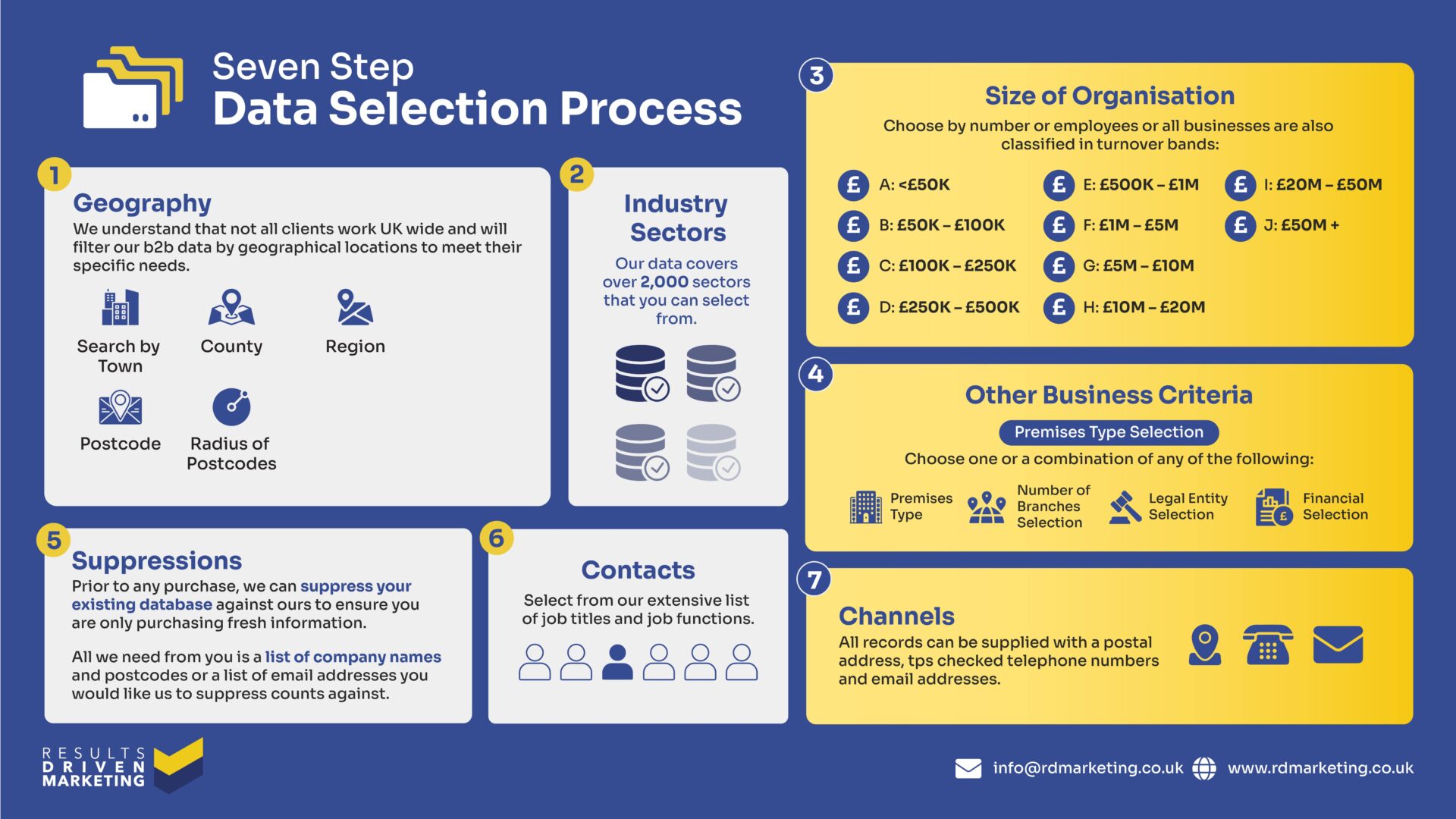
Business Data – Fill Your Sales Pipeline Today
Decision-makers rely heavily on business data to not only understand their markets but to actually fill their sales pipeline with reliable prospects. High-quality business data has become the fuel that drives each stage of the lead generation process.
By using accurate, up-to-date, and properly segmented business data, sales teams are better positioned to engage with potential customers, nurture relationships, and ultimately secure more deals.
This is especially relevant if you’re looking to refine your targeting strategy, improve response rates, or scale outreach efforts. It’s not just about gathering contact details; it’s also about using trusted B2B Data to connect with the right audiences at the right time.
By partnering with specialists like www.rdmarketing.co.uk, you can leverage valuable data solutions tailored to your unique needs.
As you move through this guide, you’ll gain insights into structuring your sales pipeline around business data, exploring actionable steps, and tapping into diverse resources (such as segmented Direct Mail Data) that can fast-track your growth. Let’s dive in and uncover a data-driven roadmap that optimises your entire sales process.
Table of contents:
What Is Business Data?
Business data refers to the diverse pool of information companies rely on to identify prospects, engage with existing clients, and ultimately drive sales performance.
It’s basically all those granular details—such as industry sectors, employee counts, purchasing behaviors, technology stacks, and contact information—that help your sales team understand who they’re reaching out to and how to approach them.
When we talk about types of business data, there are a few key categories you’ll want to get familiar with:
- Firmographic data: Company-level info like size, location, and industry verticals.
- Technographic data: Insights into the software, tools, and platforms a business uses.
- Demographic data: Individual-level attributes such as job titles, decision-making authority, and roles.
- Transactional data: Historical records of past purchases, deal sizes, or contract renewals.
Quality matters, a lot. If the business data you’re using is outdated, incomplete, or irrelevant, your sales pipeline will suffer. High-quality, validated sources—like those available through Telemarketing Data and Email Address List Data—help ensure you’re not wasting time on dead ends or irrelevant leads.
Instead, by tapping into premium solutions from providers like www.rdmarketing.co.uk, you’re equipping your team with relevant, accurate business data that enhances targeting, nurtures stronger prospect relationships, and ultimately leads to more successful deals. With reliable data in hand, you can refine your outreach, streamline lead generation, and get straight to the heart of what really matters: closing more sales.
The Role of Business Data in Sales
When it comes down to driving more effective outreach, using reliable business data really makes all the difference. By leveraging trusted and well-organised business data, sales teams can identify high-value prospects, focus their efforts on the right industries, and tailor their messaging to resonate with each unique buyer. Instead of taking a shot in the dark, you’re using structured insights to guide every interaction and decision.
Think about it this way:
Data-enhanced targeting – With premium International Email List solutions, your sales team can break into new global markets, targeting companies that fit your ideal customer profile and match specific criteria.
Personalisation at scale – Thanks to refined business data, it’s easier to segment audiences into smaller, more meaningful groups. This allows you to send customised offers or recommendations and truly connect with prospects who share common traits.
Smarter outreach – Having access to trustworthy Consumer Data can also inform strategic follow-ups. By aligning outreach patterns with known preferences, your team can engage leads with relevant information at just the right time.
Plus, when you pair business data with analytics tools, CRM platforms, and even AI-driven dashboards, interpreting patterns and trends becomes remarkably straightforward. Not only can you visualise how certain leads move through your pipeline, but you can also spot bottlenecks and refine tactics on the fly.
Using resources from www.rdmarketing.co.uk, sales professionals tap into data-driven insights that streamline prospecting, improve decision-making, and ultimately push more deals across the finish line. The end result? A sales process that’s more proactive, more deliberate, and more profitable.
Building a Data-Driven Sales Pipeline
Integrating business data into your sales pipeline, step by step, can seriously level-up your entire operation. Instead of running on guesswork, imagine having a system that guides your team’s every action—from the moment you spot a potential lead, all the way to sealing the deal. Let’s break it down into four stages:
Prospecting: Start by harnessing business data to craft ideal customer profiles. Pull information on industries, company sizes, job titles, and more.
This helps ensure you’re focusing on businesses that align perfectly with your offering. Combine that insight with verification tools like the CTPS Checker to confirm compliance, and you’re in a great position to identify the most promising leads.
Qualification: Once you’ve got a bunch of leads in hand, use business data to score and prioritise them. Look at firmographics, past behaviors, or even technology stacks to filter out low-quality prospects.
This process is a lot simpler when you’ve got reliable datasets and platforms that help you sort everything neatly.
Nurturing: Keep those leads warm by using business data to guide highly personalised messaging. Segment your audience based on their unique attributes, then send meaningful, targeted follow-ups. Consider leveraging Email Marketing Management Services to automate email campaigns.
The right business data, paired with automation tools and data integration platforms, transforms your entire pipeline.
With guidance from www.rdmarketing.co.uk and the smart use of advanced data solutions, it’s easier than ever to move leads smoothly through every stage. The result? A more efficient, consistent, and profitable sales process.
Identifying the Right Sources of Business Data
Locating the perfect sources for your business data can feel like a never-ending puzzle, but it doesn’t have to be. Start by considering trusted third-party data providers—companies that specialise in gathering, refining, and distributing high-quality datasets.
Industry-specific directories, LinkedIn Sales Navigator, company websites, and even reputable industry reports are all valuable wells of insight that can help you uncover fresh leads, key decision-makers, and relevant market trends.
But there’s more to it than just finding a source; you also need to ensure the quality and reliability of the business data you’re using. Be on the lookout for:
- Accuracy checks: Confirm that details like names, job titles, and contact info match up.
- Regular updates: Outdated data can send you chasing dead ends, so look for providers who refresh their lists frequently.
- Compliance: Make sure the data is collected legally and ethically. Look for tools that follow stringent data privacy regulations.
Also, if you stumble upon data that seems too good to be true—like an unusually large number of perfect leads or massive lists with no verification steps—consider that a red flag. Unreliable or outdated information can waste your team’s time and resources. Instead, consider tapping into specialised services.
For instance, Data Cleansing Services can help weed out inaccuracies, while Data Enrichment Services refine and supplement existing datasets. By leveraging these solutions through providers like www.rdmarketing.co.uk, you’ll have a steady stream of precise, compliant, and highly relevant business data.
With the right sources and a smart data strategy, you’ll be better equipped to engage prospects, streamline campaigns, and keep your pipeline humming along.
Data Management and Validation Best Practices
Keeping your business data in top shape requires a combination of ongoing maintenance, careful oversight, and a strong commitment to compliance. Regularly cleaning and normalising data sets helps ensure that all those crucial details—like company names, addresses, and titles—are always accurate and up-to-date.
Think of it as a routine tune-up: if you don’t take the time to remove duplicates, verify entries, and correct inaccuracies, you could end up chasing leads that no longer exist.
To maintain high-quality business data, consider these practical steps:
- Schedule frequent data audits to catch any errors early.
- Update records regularly, especially if you’re working with sources like Direct Mail Data that can age quickly.
- Use validation tools that cross-check data against known databases.
It’s also essential to consistently enrich your business data over time, adding fresh details or missing attributes so you always have a complete, 360-degree view of prospects. Ongoing data enrichment can help you spot better opportunities, craft more targeted outreach, and refine your overall strategy.
Moreover, don’t overlook data governance frameworks and compliance issues. Regulations like GDPR or CCPA aren’t just red tape; they safeguard consumer rights and maintain trust. Prioritise ethical data usage and follow established best practices.
If your business data is sourced, managed, and enriched with the right tools and guidance—like those available at www.rdmarketing.co.uk—you’ll be well on your way to enjoying cleaner, more reliable information that powers smarter decision-making and more efficient sales efforts. Your pipeline will thank you for it.
Tools and Technologies for Harnessing Business Data
When it comes to getting the most out of your business data, the right tools and technologies can make all the difference. Imagine plugging your freshly sourced business data into a robust CRM platform, where each lead’s details are at your fingertips.
Picture tapping into marketing automation tools that trigger personalised outreach campaigns the moment certain conditions are met. And consider analytics software that turns scattered figures into easy-to-read charts, graphs, and dashboards—perfect for visualising which prospects are moving forward and which might need a little nudge.
You might start by connecting your CRM with a steady flow of enriched, high-quality records. Services like B2B Data or Telemarketing Data seamlessly integrate, so your reps always have the right info at the right time.
Maybe you layer on marketing automation features that pair smoothly with Email Address List Data—it’s all about sending targeted messages without manual intervention. For those looking to refine further, artificial intelligence-driven solutions can predict buyer intent, highlight leads most likely to convert, and guide your team in prioritising outreach.
With AI tools, your business data transforms from a static asset into an active resource, informing every move you make.
Let’s say you’ve got a dashboard that shows how leads from specific markets respond to certain campaigns. With a quick glance, you can decide whether to invest in that channel or adjust your messaging. Add www.rdmarketing.co.uk and their advanced resources to the mix, and your sales operation just got a whole lot smarter.
By leveraging the right combination of CRMs, analytics tools, automation platforms, and integrated data services, you can squeeze every drop of value from your business data, making smarter decisions and accelerating your path to success.
Measuring the Impact of Data on Your Sales Pipeline
Tracking the impact of business data on your sales pipeline involves more than just gut instinct—it’s about monitoring key performance indicators (KPIs) and adjusting your strategy based on solid evidence.
By regularly reviewing metrics like lead-to-opportunity conversion rates, pipeline velocity, and close rates, you can see which segments are thriving and which might need a little extra attention. Want to know if your messaging is hitting the mark?
Just watch how quickly leads move through the funnel after implementing changes guided by reliable business data.
To make sense of these numbers, set clear goals for your team and review dashboards, reports, and visual charts at regular intervals.
For instance, segmenting outreach based on verified Direct Mail Data can help you see which geographies respond best, while enriching your existing records with services like Data Enrichment Services ensures that all those crucial details stay current.
With guidance from www.rdmarketing.co.uk and a steady stream of up-to-date business data, you’ll have the insights needed to fine-tune your approach, spot new opportunities, and ultimately transform your pipeline into a leaner, more effective revenue engine.
Conclusion
At the end of the day, embracing business data isn’t just a trend—it’s the key to sustainable growth and a healthier sales pipeline. By leveraging accurate, enriched information, you can better understand what your ideal buyers want, refine your messaging, and shorten the path from lead to deal. With so many options at your fingertips, there’s no reason to settle for guesswork anymore.
Working closely with experts like www.rdmarketing.co.uk and drawing on resources such as International Email List can push your sales strategy forward. Start by selecting quality business data, integrate it into your tech stack, regularly review your results, and keep adapting.
The more you embrace a data-driven mindset, the more confidently you’ll navigate new opportunities, close bigger deals, and ultimately fuel long-term success.
Who are we?
Thinking about “how do I buy data“?
Providing b2b database solutions is our passion.
Offering a consultancy service prior to purchase, our advisors always aim to supply a database that meets your specific marketing needs, exactly.
We also supply email marketing solutions with our email marketing platform and email automation software.
Results Driven Marketing have the best data of email lists for your networking solutions as well as direct mailing lists & telemarketing data in telemarketing lists
We provide data cleansing and data enrichment services to make sure you get the best data quality.
We provide email marketing lists and an international email list for your business needs.
At RDM We provide b2c data as we have connections with the best b2c data brokers.
A good quality b2b database is the heartbeat of any direct marketing campaign…
It makes sense to ensure you have access to the best!
Call us today on 0191 406 6399 to discuss your specific needs.
Results Driven Marketing
0191 406 6399









